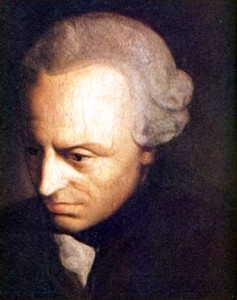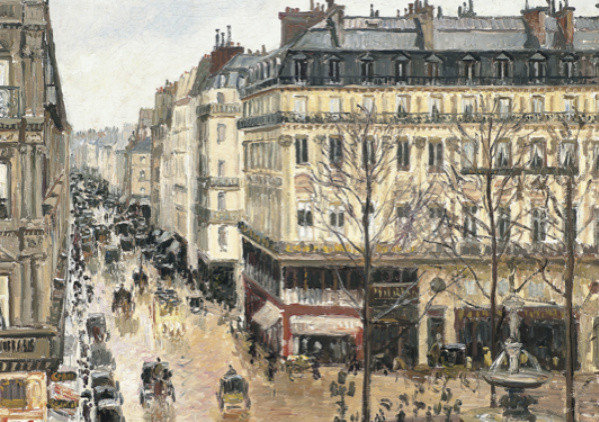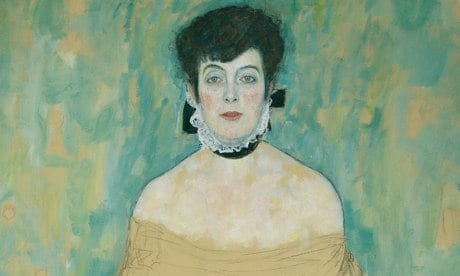Just a week after it was introduced by Steve Chabot (R-OH), the Foreign Cultural Exchange Jurisdictional Immunity Clarification Act (HR 4292) was marked for hearing today. Three members spoke in favor, a voice vote was taken, and bill was referred favorably to the full House.
Foreign Cultural Exchange Jurisdictional Immunity Clarification Act Passes House Judiciary Committee on Voice Vote
Topics: Restitution, World War II, Foreign Sovereign Immunities, Immunity from Seizure Act, Foreign Cultural Exchange Jurisdictional Immunity
Foreign Cultural Exchange Jurisdictional Immunity Clarification Act Reintroduced in House of Representatives, Would Ban Use of Exhibition Loan as Basis for Federal Court Jurisdiction
Steve Chabot (R-OH) has reintroduced the Foreign Cultural Exchange Jurisdictional Immunity Clarification Act (H.R. 4292), after a previous attempt to amend the Foreign Sovereign Immunities Act with regard to the loan of cultural objects failed to become law in 2012. The text of the March 25, 2014 bill is identical to the version that passed in the House in 2012. Its co-sponsors are John Conyers (D-MI) and Bob Goodlatte (R-VA), and it has been referred to the House Judiciary Committee.
Topics: Cornelius Gurlitt, Malewicz v. City of Amsterdam, Girolamo Romano, Gurlitt Collection, 22 U.S.C. § 2459, Christ Carrying the Cross Dragged by a Rogue, 517 F.Supp.2d 322, FSIA, Restitution, David Toren, 19 U.S.C. § 1595a, Steve Chabot, Orrin Hatch, House Judiciary Committee, 28 U.S.C. § 1605(a)(2), 28 U.S.C. § 1605(a)(3), Senate Bill 2212, World War II, IFSA, Foreign Sovereign Immunities, Altmann v. Republic of Austria, Portrait of Wally, John Conyers, Immunity from Seizure Act, Dianne Feinstein Foreign Sovereign Immunities Act, Federal Republic of Germany, 28 U.S.C. § 1605, H.R. 4292, Foreign Cultural Exchange Jurisdictional Immunity
U.S. Again Asks Court to Ignore Russian Defiance of Chabad Judgment, and for Advance Notice to Hinder Plaintiffs’ Exercise of their Rights
In response to the recent request by the Agudas Chasidei Chabad plaintiffs for an interim judgment on the compounding sanctions judgment for the Russian Federation’s refusal to comply with a 2010 judgment to return the ancestral library of the movement’s leader (Rebbe), the United States has filed a statement of position and asked the U.S. District Court to ignore Russia’s willful defiance of that judgment. The statement of position cites some credible post-judgment remedy law, but it is mostly a re-hashing of the previously statement filed by the U.S. which the court declined to adopt when it sanctioned the Russian defendants last year. The U.S. position also continues to argue that letting diplomatic avenues run their course is the prudent move, even though there is not the slightest indication that Russia is paying U.S. diplomats any mind whatsoever. More worriedly, the U.S. asks that the plaintiffs be required to advise the government before taking any further action. It is hard to avoid the irony that the United States is asking for an order that its citizens be required to advise the government of their intent to vindicate their rights against Russia.
Topics: Yossarian, Immanuel Kant, Foreign Sovereign Immunities Act, Rebbe, Agudas Chasidei Chabad, Catch 22, Categorical Imperative, Russian Federation, FSIA, Restitution, IFSA, Foreign Sovereign Immunities, Joseph Heller, Immunity from Seizure Act
Cassirer Heirs' Claims to Pissarro Work Revived by Appeals Court, the Year 2013 Shows that the Tide for Restitution May be Shifting Again
The U.S. Court of Appeals for the 9th Circuit restored last week claims by heirs of Lilly Cassirer against the Thyssen-Bornemisza Collection for the return of the Camille Pissarro painting Rue St. Honoré, après-midi, êffet de pluie.
Topics: Nuremberg laws, Schwabinger Kunstfund, Cornelius Gurlitt, Lilly Cassirer, California Code of Civil Procedure § 338(c), Dorothy Nelson, Thyssen-Bornemisza Collection, Julius Schoeps, Rue St. Honoré après-midi êffet de pluie, Claude Cassirer, Von Saher v. Norton Simon, de Csepel, Jacques Goudstikker, California Code of Civil Procedure § 354.3, Gurlitt Collection, Foreign Sovereign Immunities Act, Hans Sachs, Von Saher v. Norton Simon Museum of Art at Pasaden, Madame Soler, Bundesgerichtshof, Hildebrand Gurlit, Entartete Kunst, Hans-Heinrich Thyssen-Bornemisza, Hungarian National Gallery, Nazis, Munich, Deutches Historisches Museum, FSIA, Preemption, Gurlitt, Harry Pregerson, Restitution, field preemption, Marei Von Saher, Herzog collection, Bavaria, Claudia Seger-Thomschitz, Looted Art, World War II, Foreign Sovereign Immunities, Pinakothek der Moderne, degenerate art, Altmann v. Republic of Austria, 578 F.3d 1016, Freistaat Bayern, beschlagnahmte Kunst, Camille Pissarro, Kim McLane Wardlaw, Nürnberger Gesetze, Raubkunst, Museum of Fine Arts Boston, Cassirer v. Thyssen-Bornemisza Collection, verschollene Kunst, Kunstfund München
327 Gurlitt Collection Works Now Known; Time for Claims in the United States?
The coordination office in Magdeburg continues to post details about works of art seized from Cornelius Gurlitt in Schwabing, with a total of 327 works now available for viewing. There has been almost no discussion yet, however, of what process the government will employ to allow claimants to make their case. Those in the United States have options discussed further below.
Topics: veschollene Kunst, Schwabinger Kunstfund Cornelius Gurlitt, Strafprozessordnung, Hildebrand Gurlitt, EBS Dispute Resolution Center, Munich Hoard, IFKUR, Verjährungsfrist, Peter Bert, Germany, Matthias Weller, prescriptive ownership, Nazi-looted art, Gurlitt Collection, Foreign Sovereign Immunities Act, Baden-Württemberg, Entartete Kunst, Nazis, Ingeborg Berggreen-Merkel, Munich, Schwabing, Magdeburg, FSIA, Dispute Resolution in Germany, Bavaria, Looted Art, Foreign Sovereign Immunities, deutches Recht, degenerate art, Altmann v. Republic of Austria, www.lostart.de, stop, Raubkunst, German Civil Code § 221, Sec. 108 German Code of Criminal Procedure, Kunstfund München, Münchner Kunstfund
Dispute Over "Portrait of Amalie Zuckerkandl" on Loan to National Gallery—Calls for Restitution Put International Respect for Final Judicial Awards, Other Claims, at Risk
A recent loan to the National Gallery in London has grabbed headlines discussing the history of the painting, Portrait of Amalie Zuckerkandl, by Gustav Klimt, surrounding World War II and the persecution of Jews in Austria. Somewhat puzzlingly, the coverage has downplayed the fact that that very painting was already the subjective of an exhaustive proceeding in Austria that denied restitution, a decision reviewed and affirmed by the Austrian Supreme Court (though, apparently, also the subject of more recent requests for reconsideration). Should a claim for restitution or seizure be filed while the painting is outside Austria, in the UK or the US, it could have a troubling effect on respect for final judgments, as well as unintended consequences for restitution claimants who may find their judgments collaterally attacked elsewhere. As difficult as it may seem, the painting cannot be disturbed without putting a great deal more at risk.
Topics: Maria Altmann, Portrait of Adele Bloch-Bauer, Jonathan Jones, National Gallery London, the Guardian, Vita Künstler, Dr. Erich Führer, Beethoven Frieze, Belvedere, the United Nations Convention on the Recognition a, Jugendstil, Portrait of Amalie Zuckerkandl, Hermine Müller-Hofmann, Amalie Zuckerkandl, Restitution, Neue Galerie, World War II, Foreign Sovereign Immunities, Facing the Modern: The Portrait in Vienna in 1900, Kokoschka, Secession, Secession Museum, Austria, Ferdinand Bloch-Bauer, Fin de siècle, Gustav Klimt, Vienna, Anschluss, UNCITRAL
Revival of the Foreign Cultural Exchange Jurisdictional Immunity Clarification Act?
The Holocaust Art Restitution Project reports today that a new version of Senate Bill 2212, the Foreign Cultural Exchange Jurisdictional Immunity Clarification Act that would have amended the Foreign Sovereign Immunities Act to preclude claims against defendants whose “commercial activity” is limited to the loan of artwork whose ownership is in dispute, but which are immunized from seizure pursuant to the Immunity from Seizure Act (22 U.S.C. § 2459). The Art Law Report covered the bill extensively last year. Although the bill as previously passed would have exempted Holocaust claims from the exception, the bill in broad terms was designed to prevent another Malevich v. City of Amsterdam situation, in which the very loan of a painting immunized from seizure was itself held to satisfy the commercial activity jurisdictional requirements of the FSIA.
Topics: Holocaust Art Restitution Project, Foreign Sovereign Immunities Act, 22 U.S.C. § 2459, Association of Art Museum Directors, Foreign Sovereign Immunities, Immunity from Seizure Act, Foreign Cultural Exchange Jurisdictional Immunity
Bloomberg Law Publishes My Article on the Chabad Case and Russian Art Loan Embargo
My article “Chabad Library Case and Russian Art Loan Embargo Roil International Waters” was published in the June 4, 2013 edition of Bloomberg BNA - The United State Law Week. My article reviews the history of the Chabad Lubavitch library dispute and its impact on international relations and the art world. The article is linked here, reproduced with permission from the United States Law Week, Copyright © 2013 by the Bureau of National Affairs.
Topics: Bloomberg BNA, The United State Law Week, Chabad Library Case and Russian Art Loan Embargo R, Restitution, Foreign Sovereign Immunities, Chabad Lubavitch, Publications, Jewish Museum Moscow, Nicholas M. O'Donnell
Presentation to the 5th Annual ARCA Art Crime Conference June 21-23, 2013
I will be speaking at the 5th annual Art Crime Conference held by ARCA (Association for Research into Crimes Against Art) in Amelia, Italy between June 21-23, 2013. My talk will address Holocaust restitution litigation in the United States, similar to the paper I gave in Maastricht in March but covering important more recent developments as well (notably the Hungary case).
Topics: cultural property, Vernon Rapley, Charlie Hill, Art Crime Conference, Howard Spiegler, Maastricht, Carabinieri TPC collectively, Association for Research into Crimes Against Art, John Merryman, Neil Brodie, Jason Felch, Larry Rothfield, Dick Drent, Karl von Habsburg, Restitution, World War II, Lord Colin Renfrew, Foreign Sovereign Immunities, Paolo Giorgio Ferri, Stuttgart Detective Ernst Schöller, Francesco Rutelli, Amelia, Ralph Frammolino, ARCA, Italy, Norman Palmer, Dr. Joris Kila, Dr. George H. O. Abungu
DC Circuit Reinstates All Claims that Were Dismissed in Herzog Case Against Hungary-UPDATED
The DC Circuit Court of Appeals has reinstated the entire set of claims brought by the Herzog heirs against the Hungarian National Gallery, the Budapest Museum of Fine Arts, the Museum of Applied Arts, and the Budapest University of Technology and Economics. The appellate decision focuses on the claim that an agreement was reached after WWII to hold the paintings for their owners, not the claims relating to their wartime fate. In so doing, the court pushed to the side a whole range of defenses for sovereign defendants that have been increasingly successful. The court also reinstated claims to ownership of 11 works whose title was previously litigated, in an opinion that sets a low bar for collateral attacks on foreign judgments.
Topics: David de Csepel, Nazi Germany, Angela Maria Herzog, Hungary, WWII, Viktor Orban, res judicata, Julia Alice Herzog, Budapest University of Technology and Economics, Baron Mor Lipot Herzog, Hungarian National Gallery, Jori Finkel, Budapest Museum of Fine Arts, Adolf Eichmann, FSIA, expropriation exception”, Restitution, 28 U.S.C. § 1605(a)(2), 28 U.S.C. § 1605(a)(3), World War II, Foreign Sovereign Immunities, Alison Frankel, András Herzog, Janos Lazar, Museum of Applied Arts





